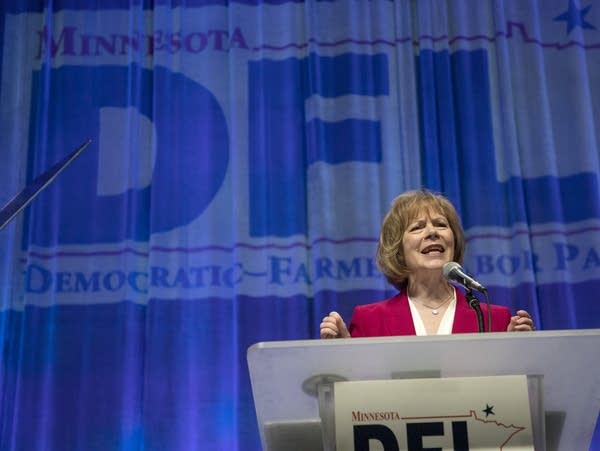DFL Sen. Tina Smith on the Mueller report

Go Deeper.
Create an account or log in to save stories.
Like this?
Thanks for liking this story! We have added it to a list of your favorite stories.
Special counsel Robert Mueller's investigation into Russian interference in the 2016 presidential election is over. According to a four-page summary of the report released Sunday by Attorney General William Barr, the Russian government did interfere with the election, but the Trump campaign did not conspire or coordinate with the Russians.
Barr's summary also says the report does not exonerate President Trump from charges that he obstructed justice. Instead, the report presents evidence on both sides of that question, leaving the final decision to the Attorney General — who writes in his summary that "the evidence developed during the Special Counsel's investigation is not sufficient to establish that the President committed an obstruction-of-justice offense."
MPR News host Cathy Wurzer talked to Sen. Tina Smith, D-Minn., about the conclusions summarized in the attorney general's letter.
Comments have been edited for length and clarity.
Turn Up Your Support
MPR News helps you turn down the noise and build shared understanding. Turn up your support for this public resource and keep trusted journalism accessible to all.
Cathy Wurzer: The president, as you know, has said all along there was no collusion. Is there any sense of relief on your part that Robert Mueller did not find there was a conspiracy between the Trump campaign and the Russians to influence the election?
Sen. Tina Smith: Well, I'm very much looking forward to seeing this entire report, so that I can fully understand what is included in it and how these decisions have been [made] and thinking has been done. You know, I think it's important to remember what this is all about. This is about whether Russia interfered in our election, and we found out that they did, and the investigation has revealed exactly how that happened.
What we know from this short four-page summary by the attorney general is that the special prosecutor did not establish that the Trump campaign conspired or coordinated with the Russian government. But they also couldn't conclude one way or the other whether the President committed the crime of obstruction, and so getting to the bottom of this, getting all the information out, a strong presumption for openness I think is very, very important right now.
Wurzer: And continued hearings — should Congress continue to dive into some of the issues around this report?
Smith: Well, this is a really good point. So far, this investigation has resulted in over 30 individuals indicted or pleading guilty, including five that are close to the president. And you know, the Wall Street Journal reported this morning that there are about a dozen other probes that have come about, many of them as a result of this investigation, including whether, you know, hush money [was] paid by the campaign of President Trump, what's going on with the inaugural committee, investigations into the Trump Organization and the Trump Foundation. It's very, very important that all of those investigations be allowed to continue so that we can — you know, this is about the rule of law, in my view.
Wurzer: But are you concerned about the potential political repercussions if Democrats keep investigating what many people will see as a settled issue?
Smith: Well, I'm concerned about the rule of law and protecting our democracy. And to me, we have to rise above the politics of this and really focus on the facts.
Wurzer: Let's talk about the fact that the Mueller report shows the Russian government did interfere with the 2016 presidential election. What should Congress do going forward to make sure that foreign governments don't interfere in our elections again?
Smith: Well, this is something that is incredibly important. The investigation found that there was a massive and illegal disinformation campaign on social media, fake rallies and so forth, and also that there was this illegal hacking onto the computers of the Clinton campaign and the DNC with the purpose of hurting one campaign and helping another. This is about the integrity of our elections, and we really need to put, I think, much more attention on this.
Just a week or so ago, the House passed a bill that was focused on improving the integrity of our elections. Unfortunately, that bill hasn't come up in the Senate yet, but that's really just scratching the surface because it doesn't get at the power of foreign companies and others of spreading disinformation on social media. I think that this is something that the Senate Judiciary Committee and the House Judiciary Committee should be looking at.
Wurzer: So going forward, you think the whole report should be released and investigations continue. I'm curious, what do you make of the decision to leave the decision on obstruction up to the attorney general?
Smith: I have great respect for the special prosecutor Robert Mueller, and he has said that he either couldn't conclude one way or the other about whether there was obstruction. I was surprised that in only 48 hours the attorney general felt that he could make the decision that there was no evidence of obstruction, when the special prosecutor couldn't make that decision himself. I think it's important that Congress has an opportunity to weigh in here. I mean, this is really our job, to hold the executive branch to account when there are situations like this, and I think we need to do that job.


